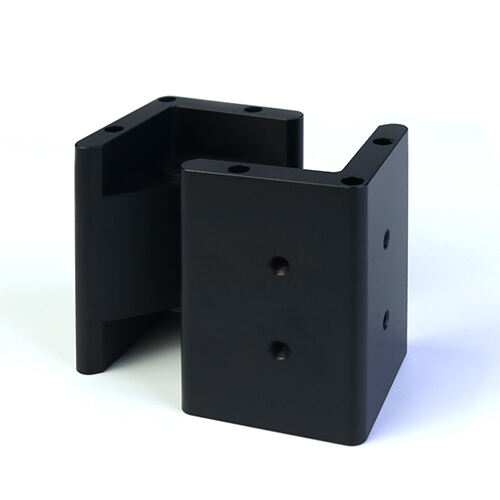Gia công tùy chỉnh bằng máy phay servo mở ra kỷ nguyên mới của sản xuất chính xác
Trong làn sóng bùng nổ của ngành công nghiệp chế tạo hiện nay, công nghệ phay servo gia công tùy chỉnh đang trở thành lực lượng then chốt thúc đẩy sự phát triển của nhiều ngành với hiệu suất tuyệt vời và tính linh hoạt cao, mang lại những thay đổi chưa từng có cho lĩnh vực sản xuất chính xác.

Bước đột phá về công nghệ: lợi thế cốt lõi của phay servo
Tâm điểm của công nghệ phay phục vụ gia công tùy chỉnh nằm ở hệ thống servo tiên tiến của nó. Hệ thống này giống như một nhạc trưởng chính xác, có khả năng kiểm soát chính xác từng động tác của dụng cụ phay. Thông qua các bộ mã hóa độ chính xác cao và động cơ phản hồi nhanh, hệ thống servo có thể đạt được độ chính xác định vị ở mức micromet hoặc thậm chí cao hơn. Khi chế tạo các chi tiết phức tạp, dù là các bộ phận hàng không chính xác hay các thành phần thiết bị y tế tinh vi, độ chính xác này đảm bảo rằng mọi chi tiết đều đáp ứng các yêu cầu thiết kế nghiêm ngặt. Ví dụ, trong quá trình gia công cánh quạt động cơ máy bay, phay servo có thể tạo hình hoàn hảo bề mặt phức tạp của cánh quạt, đảm bảo chúng vận hành ổn định trong môi trường cực đoan của nhiệt độ cao và tốc độ cao, đồng thời nâng cao hiệu suất và độ tin cậy của động cơ.
Ngoài ra, khả năng phản hồi động tốc độ cao của hệ thống phay servo cũng là một điểm nổi bật. Trong quá trình gia công, khi gặp những thay đổi phức tạp trong đường dẫn gia công hoặc cần điều chỉnh các thông số cắt, hệ thống servo có thể phản hồi ngay lập tức và nhanh chóng điều chỉnh tốc độ và vị trí của dụng cụ. Điều này không chỉ cải thiện đáng kể hiệu suất gia công mà còn giảm thiểu rung động và sai số trong quá trình gia công, đảm bảo chất lượng bề mặt của chi tiết đạt mức rất cao. Khả năng phản hồi động tốc độ cao này được thể hiện rõ ràng trong việc sản xuất các linh kiện ô tô, chẳng hạn như gia công khối xy-lanh động cơ, có thể hoàn thành chính xác và nhanh chóng việc gia công cấu trúc nội bộ phức tạp, tạo nền tảng cho hoạt động hiệu suất cao của xe hơi.
Ứng dụng rộng rãi: thúc đẩy sự phát triển của nhiều ngành công nghiệp
Lĩnh vực ứng dụng của công nghệ phay servo gia công tùy chỉnh rất rộng rãi, bao phủ hầu hết tất cả các lĩnh vực quan trọng của sản xuất hiện đại.
Trong lĩnh vực hàng không vũ trụ, có nhu cầu cao về chất lượng và độ chính xác của các bộ phận, và công nghệ phay servo gia công tùy chỉnh cung cấp phương pháp xử lý đáng tin cậy. Từ cấu trúc cánh của máy bay đến các bộ phận quan trọng của vệ tinh, mỗi phần đều cần trải qua quá trình phay chính xác để đảm bảo độ tin cậy và hiệu suất trong môi trường không gian khắc nghiệt hoặc điều kiện bay tốc độ cao. Ví dụ, giá đỡ tấm pin mặt trời của vệ tinh cần có độ mạnh và chính xác cao mà vẫn nhẹ الوزn. Thông qua gia công tùy chỉnh và phay servo, các hình dạng phức tạp đáp ứng yêu cầu có thể được gia công chính xác để đảm bảo hoạt động ổn định của vệ tinh trong không gian.
Ngành công nghiệp sản xuất ô tô cũng là một trong những ngành thụ hưởng quan trọng từ công nghệ phay servo gia công tùy chỉnh. Cùng với sự phát triển của xe hơi theo hướng giảm trọng lượng, hiệu suất cao và thông minh hóa, yêu cầu về độ chính xác gia công của các bộ phận then chốt như động cơ, hộp số và khung gầm ngày càng tăng cao. Công nghệ phay servo có thể đạt được việc gia công hiệu quả và chính xác cao cho các bộ phận này, cải thiện hiệu suất tổng thể và khả năng tiết kiệm nhiên liệu của xe hơi. Ví dụ, trong quá trình gia công vỏ động cơ xe điện, phay servo gia công tùy chỉnh có thể đảm bảo độ chính xác kích thước và hiệu suất tản nhiệt của vỏ, cải thiện hiệu suất làm việc và tuổi thọ của động cơ.
Trong lĩnh vực thiết bị y tế, công nghệ gia công phay servo theo yêu cầu đóng vai trò quan trọng. Từ các vật liệu cấy ghép chỉnh hình đến dụng cụ phẫu thuật chính xác, cần độ chính xác cực cao và khả năng tương thích sinh học tốt. Các bộ phận thiết bị y tế được xử lý thông qua công nghệ này có thể đáp ứng tốt hơn nhu cầu y tế và cung cấp sự đảm bảo mạnh mẽ cho việc điều trị và phục hồi của bệnh nhân. Ví dụ, các vật liệu cấy ghép chỉnh hình tùy chỉnh có thể khớp hoàn hảo với xương người, giảm đau đớn cho bệnh nhân và thời gian hồi phục.
Ngành công nghiệp truyền thông điện tử cũng dựa vào công nghệ gia công phay servo tùy chỉnh. Với sự phát triển nhanh chóng của công nghệ truyền thông 5G, thiết bị cơ sở hạ tầng truyền thông và các sản phẩm điện tử như smartphone có yêu cầu ngày càng cao về độ chính xác và hiệu suất của các linh kiện. Công nghệ phay servo có thể chế tạo các bộ phận chính xác đáp ứng các yêu cầu đặc biệt như tản nhiệt và truyền tín hiệu, chẳng hạn như anten phản xạ cho trạm gốc truyền thông và tản nhiệt cho điện thoại di động, đảm bảo hoạt động ổn định và hiệu suất cao của thiết bị truyền thông điện tử.
Triển vọng trong tương lai: Sự đổi mới và phát triển liên tục
Với sự tiến bộ không ngừng của công nghệ, công nghệ phay servo gia công tùy chỉnh cũng không ngừng đổi mới và phát triển. Trong tương lai, chúng ta có thể mong đợi những hệ thống servo tiên tiến hơn, độ chính xác và tốc độ phản hồi sẽ được cải thiện hơn nữa để đáp ứng các yêu cầu gia công khắt khe hơn. Đồng thời, xử lý thông minh sẽ trở thành hướng phát triển chính, đạt được tối ưu hóa tự động, dự đoán lỗi và giám sát chất lượng thời gian thực cho quá trình xử lý thông qua việc tích hợp các công nghệ như trí tuệ nhân tạo và dữ liệu lớn.
Ngoài ra, trong lĩnh vực chế biến vật liệu, công nghệ phay servo gia công tùy chỉnh sẽ tiếp tục mở rộng phạm vi ứng dụng của mình, khả năng gia công các vật liệu mới và vật liệu composite sẽ được nâng cao hơn nữa. Điều này sẽ cung cấp hỗ trợ mạnh mẽ hơn cho sự phát triển của các lĩnh vực tiên tiến như hàng không vũ trụ và năng lượng mới, và thúc đẩy các ngành công nghiệp này tiến lên mức cao hơn.
Tóm lại, công nghệ phay servo gia công tùy chỉnh, với những ưu thế kỹ thuật nổi bật, dịch vụ tùy chỉnh cao và triển vọng ứng dụng rộng rãi, đang trở thành một phần không thể thiếu trong sản xuất hiện đại và cung cấp nguồn động lực liên tục cho sự phát triển chất lượng cao của ngành chế tạo toàn cầu.


